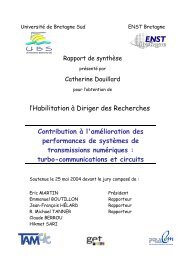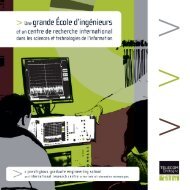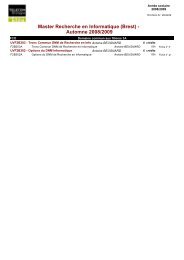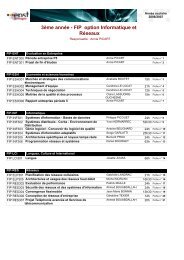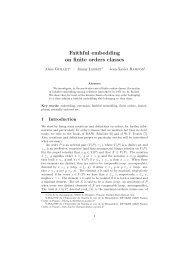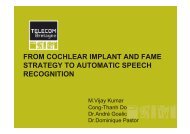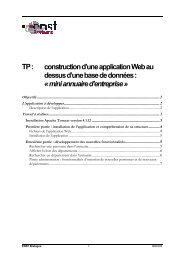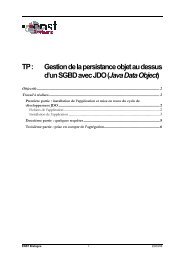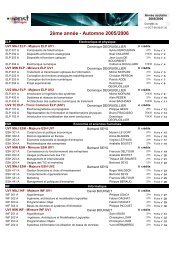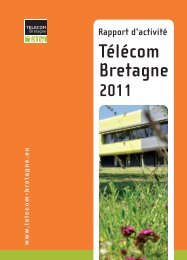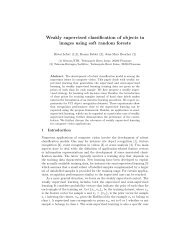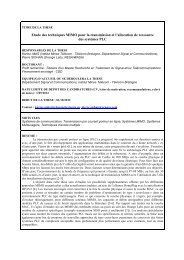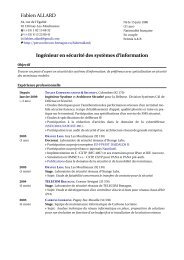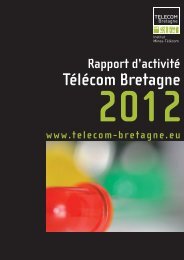researResearch - Télécom Bretagne
researResearch - Télécom Bretagne
researResearch - Télécom Bretagne
You also want an ePaper? Increase the reach of your titles
YUMPU automatically turns print PDFs into web optimized ePapers that Google loves.
esearc<br />
<strong>researResearch</strong><br />
162<br />
Contextual scenarios and science<br />
education<br />
This project was set up in the context of a PRIR<br />
called DALE, financed by the Breton region. It<br />
aims to design an adaptive Computing<br />
Environment for Human Learning (CEHL) based<br />
on real practice for student teachers. The theme<br />
of the course is : « Air as a gas with its static and<br />
dynamic aspects : properties, theory and<br />
applications ». The learners are students in the<br />
second year of Teachers' Training (IUFM) :<br />
Primary School teachers, Secondary School<br />
teachers of General Science and Mathematics<br />
and Physics and the teachers are General<br />
Science and Mathematics and Physics lecturers.<br />
This project was the subject of a thesis, with the<br />
following main results : i) A context-adaptable<br />
scenario model, based on the user's needs,<br />
described in terms of knowledge of the subject<br />
and skills ; ii) Development of a pluridisciplinary<br />
approach to the construction of the CEHL, which<br />
is organised into a methodology of co-design of<br />
the CEHL and of its parameters ; iii) Design of the<br />
CEHL based on the study and acquisition of the<br />
teachers' skills (from real practice) formalised<br />
by scenarios ; iv) A non-adaptive authoring tool<br />
for the creation and management of scenarios<br />
was designed ; v) A demonstrator of dynamic<br />
scenario generation, adapting to the context and<br />
to the learner was designed. It uses the semantic<br />
web and adaptive virtual documents to represent<br />
and implement the scenario model and its<br />
parameters with an adapted architecture which<br />
allows the different models for the development<br />
of CEHL to be integrated appropriately.<br />
Scenario models and pervasive or<br />
contextual learning<br />
This theme is covered from two points of view :<br />
one through the ANR p-Learnet project and the<br />
other through a thesis, which began in October<br />
2008, financed by the Telecom Foundation.<br />
The aim of the p-Learnet project is formal and<br />
informal human learning, in organisations, of the<br />
value chain and clients (BtoB et BtoC). We are<br />
setting up the very first French pole of Pervasive<br />
Learning. During the year 2008, the model of<br />
learning scenarios based on a hierarchical task<br />
model was refined and enhanced. The tasks<br />
represent learning activities. The task/method<br />
paradigm allows the dynamic selection of the<br />
way a task is carried out, according to the current<br />
situation – based on a context model. This model<br />
is used by different industrial partners (Auchan,<br />
UMVF, the Post Office) to model scenarios. There<br />
is also a method which allows search of web<br />
services or resources. In this case the web<br />
services or resources are specified through the<br />
defined metadata schema. The hierarchical task<br />
model, equipped with a task/method paradigm<br />
and integrated into web services and resources<br />
has been designed and is being implemented in<br />
the SCARCE environment. The scenario model<br />
has been enhanced to take into account the<br />
knowledge and skills of the learners. The<br />
scenarios, resources and web services will thus<br />
be adapted according to the current situation<br />
which includes the learner's knowledge and<br />
skills. This research work has allowed us to<br />
establish ourselves at a national and<br />
international level (conferences and journals).<br />
We have worked very hard with the Board of<br />
Research in the Telecom Institute to pool our<br />
knowledge and to create a community of<br />
pervasive learning, in order to create synergies<br />
within our institution and to structure the CEHL<br />
research topic, with specific attention to<br />
pervasive learning. This theme is almost nonexistent<br />
in the French community, whereas it is<br />
very active in the international community. This<br />
work culminated in the organisation of a Mobile<br />
Environments for Pervasive Learning workshop,<br />
2008 which brought the French community<br />
together and in a proposal for a school on mobile<br />
learning in Europe in 2009. This school will be<br />
organised at Telecom <strong>Bretagne</strong>, where we will<br />
also be in charge of the scientific coordination.<br />
A new thesis also began in October 2008 on this<br />
theme. The subject is the study, development and<br />
evaluation of the added value of contextadaptable<br />
scenarios for mobile collaborative and<br />
cooperative learning. Within the framework of<br />
Higher Education learning, Telecom <strong>Bretagne</strong><br />
has a recognised expertise in the area of projectbased<br />
pedagogy identified as a pedagogical<br />
modality, rich in terms of mobile learning. After



